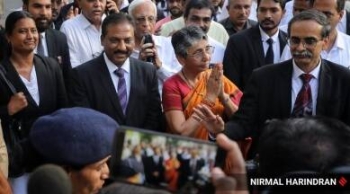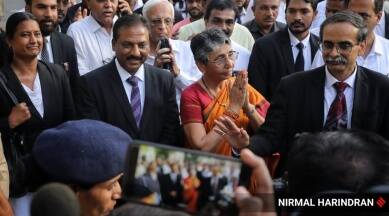
.png) John Dayal
John Dayal

“The law supposes that your wife acts under your direction," said the officer of the Court.
“If the law supposes that," said Mr. Bumble, squeezing his hat emphatically in both hands, "the law is an ass -- a idiot. If that's the eye of the law, the law is a bachelor; and the worst I wish the law is, that his eye may be opened by experience -- by experience.” ― Charles Dickens, Oliver Twist.
We went to Gujarat in a Train of Peace when the smoke and debris still marked the homes, shops and hotels of Muslims killed in a mass violence so targeted as to be called a genocide. In the refugee camps we visited were orphans and women victims of gang rape, among names that would become so painfully familiar in the two decades since then -- names such as Bilkis Bano. We never did meet the Chief minister, Mr Narendra Modi. But we did have personal experience of life under curfew, and how the army once given orders, could save lives. Possibly ours too. But that is another story.
The Train of Peace carried Professor Shamsul Islam of Delhi University and a global expert on Hindutva, his wife Neelima Sharma, a drama veteran with their street theatre troupe Nishant, former Catholic Bishops’ spokesman and communications expert Fr Dominic Emmanuel SVD, the late Swami Agnivesh, later to be joined by former Naval chief Admiral Ramdas, Navaid Hamid, now president of the Majlis e Mushawarat, and this writer.
As we went to villages and qasbas in the city and in the neighbouring districts, the issues we grappled with were the interconnected questions of command responsibility, police impunity, and the preparedness of the mobs of men and boys who turned on their neighbours in an orgy of rape and murder. In the impassive eyes of the neighbours, we saw neither pity nor remorse. We wondered if justice would ever be done. And if life ever would be normal in Gujarat.
Dozens of visit later, this writer knows that life will never be the same again. The peace one sees is of cold glass. It can be shattered at will. With senior police officers in jail for opposing the then regime, and criminals going free even after appeals to the highest court in the land, it is becoming clear that justice is taking a course hardly distinct from a convenient subservience to the powers of our era.
On 20 April, a special court in Ahmedabad acquitted 69 accused, including former Bharatiya Janata Party MLA Maya Kodnani, Bajrang Dal leader Babu Bajrangi, and Vishwa Hindu Parishad leader Jaydeep Patel in the Naroda Gam case in which 11 Muslims were killed. In 2012, Kodnani and Bajrangi were convicted in the Naroda Patiya case. Kodnani was sentenced to 28 years in jail. On appeal, the Gujarat High Court acquitted her.
The Naroda Gam case is one of nine major incidents of targeted mass violence in Gujarat in 2002 after the fire in a coach of the Sabarmati Express, in which many kar sevaks returning from the Babri Masjid Ram Mandir site in Ayodhya were killed.
Naroda Patiya was the single biggest case in which 97 Muslims were killed by a mob.
As the court found no one guilty in the massacre, Imtiaz Qureshi, 35, a survivor, told the media, “I saw them (rioters) burn to death five people, including a 10-year-old girl, in front of my eyes. I remember their faces, the clothes they were wearing, and the weapons they were carrying. You're telling me nobody killed those people?" Qureshi, also a prosecution witness, lost his home and a printing press in the Muslim Mohalla on 28 February 2002.
Another survivor, Sharif Malek, told online media, "What kind of justice do you expect from the courts when the riots are sponsored by those in power?" Malek was only 19 in 2002, and saw his house torched by the mob.
Of the 86 accused in the Naroda Gam case, 17 died during the long trial, leaving 69. Nearly 182 prosecution witnesses gave testimony.
The Justice Nanavati Commission report on the Gujarat riots recorded witnesses as saying that “there was no police help received by the Muslims and they were simply at the mercy of the miscreants”, and that police help arrived only in the evening.
An army commander had then told us that while the military was ready to quell the violence, they were not given orders. Some police officers told the Commission that all the force was at Naroda Patiya, just one km from Naroda Gam, where a much larger number of Muslims had been killed.
The Quint quoted advocate Shamshad Pathan, representing the survivors, saying, “The judgement is shameful to say the least. Are we trying to tell the witnesses and victims that nobody killed their relatives or burnt their homes? The case has already dragged on for more than 20 years and even after that we couldn't deliver justice.”
These two cases, where trial started in 2009, seven years after the riots, are in the history books because they featured responsibility by the Chief Minister, and because the current Home Minister, Mr Amit Shah, gave testimony exonerating his ministerial colleague and MLA Kodnani who had been convicted first in the Naroda Patiya Case [later acquitted by the High Court] and was facing charges of instigating the mob. Shah upheld her alibi that she was in the state assembly at the time of the murders.
Among the evidence produced by the prosecution was the video of a sting operation carried out by journalist Ashish Khetan as well as call details of Kodnani, Bajrangi and others during the relevant period.
In a powerful article in the Deccan Herald on 13 July 2023, senior journalist A V S Namboodiri, wrote: “The Supreme Court judgment which gave a clean chit to Narendra Modi over his role as Chief Minister of Gujarat during the 2002 communal riots in the state has finally taken the event from the realm of the judiciary to history.”
Zakia Jafri, the widow of slain Congress former MP Ehsan Jafri, had charged that the chief minister did not take timely action to put a stop to the riots.
The Supreme Court bench, headed by Justice A M Khanwilkar, rejected the charges and said that the inaction or failure of some officials of one section of the state administration cannot be the basis to infer that there was a pre-planned criminal conspiracy by the state government. It upheld the “clean chit” given by a Special Investigation Team (SIT) to Modi and others.
“But issues relating to moral and political responsibility will remain because these are not for the courts to settle. There is the court’s judgment, in view of the evidence available to it. There’s former Prime Minister Atal Bihari Vajpayee’s exhortation to the then Gujarat Chief Minister to follow “raj dharma”. If there is so much controversy over the role of a person in a historical event that happened just two decades ago, how do we make judgments on Tipu Sultan, Akbar, or Alexander?” says the commentator, a former Associate Editor and Editorial Adviser of the Deccan Herald.